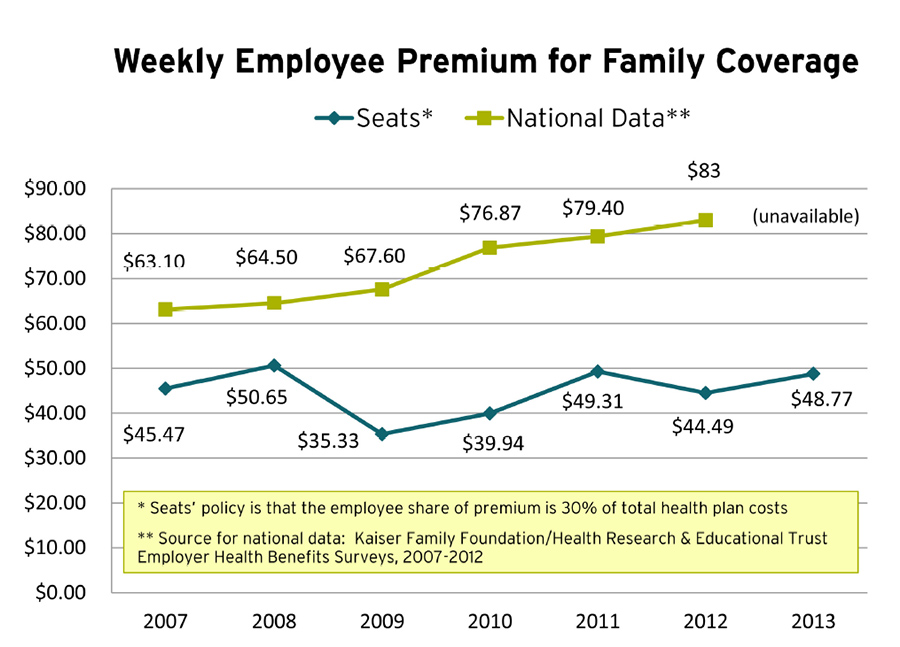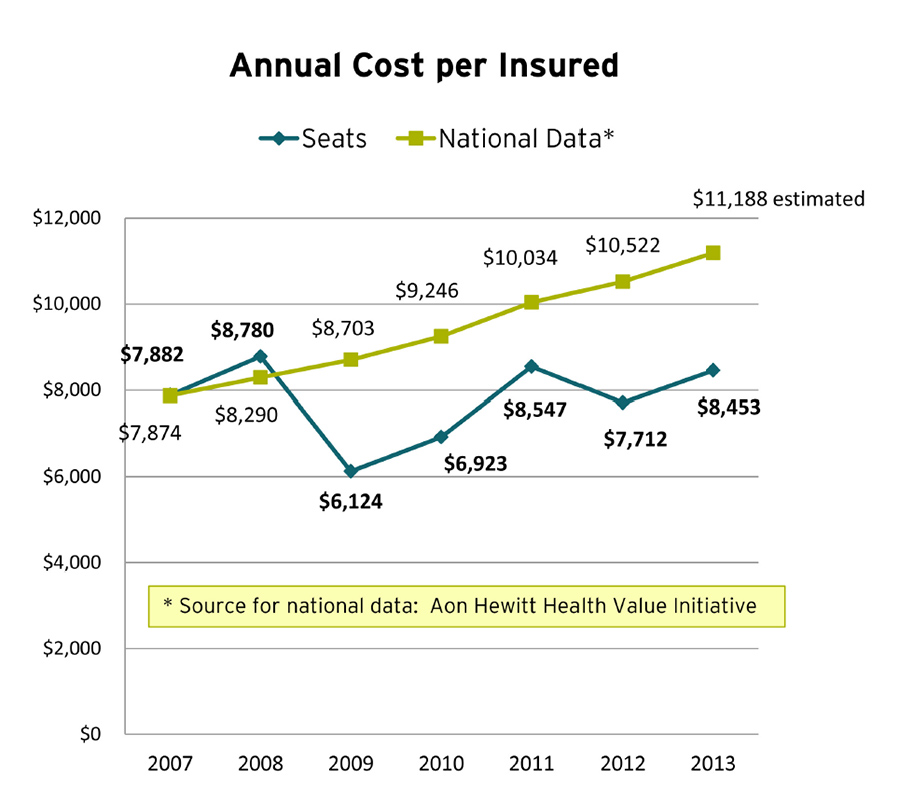Productivity is up, absenteeism is down, and Seats Incorporated knows that its persistence in pursuing fairly-priced, high-quality health care is making a difference to employees, the bottom line, and even the health care system.
Seats Incorporated has more than 30 years of experience in self-funding employee health benefits. It has nearly the same length of commitment to gainsharing, which the company uses to share the financial benefits of workplace initiatives with employees. Using health care wisely to hold down costs is a gainsharing goal.
Jerry Ward, vice president of operations, said Seats requires its more than 500 employees to pay 30% of the cost of health plan premiums so they have a personal stake in health costs. That approach is paying off for both employees and the company. Thanks to a combination of health benefit changes, self-funding and engaged health care consumers, employees paid lower health premiums in 2013 than in 2008.


On-site Clinics
An important change occurred in 2008: Seats hired a physician for its on-site Advanced Primary Care clinic, which was previously staffed only by a nurse. The physician’s hours gradually increased to three days a week at the manufacturing plant, with the nurse available throughout the week. Visits are scheduled so employees have minimal waiting and a quick return to work.
“I can leave my desk and in less than two minutes be in front of the doctor for an appointment,” Ward said.
When the doctor is off-site, employees who need to see a doctor can use a worksite wellness clinic adjacent to a neighboring company less than a mile away. All on-site services are free to employees and dependents even if they do not participate in the company’s health benefit plan. Yet Seats still saves money over visits to traditional physician clinics, where the cost of care is much higher. Ward notes Seats was able to establish the clinic with minimal investment by using existing offices and used medical equipment.
Making Choices
The on-site clinic offers only primary care services, so specialty care must be obtained at other facilities. Employees and family members can also choose to use other primary care services under the health plan and pay any out-of-pocket costs incurred under Seats’ high-deductible health plan.
“We don’t force people to pick one option, but we do communicate a lot about the costs and benefits,” Ward said. “Quite honestly, people just love the on-site clinic.”
Seats has gradually expanded to offer other on-site services, including:
- An occupational therapist one day a week, which is free to employees.
- Chiropractic care two afternoons a week, with employees paying $10 per visit.
- A massage therapist one half-day a week, with employees paying the full cost of $15 for a 20-minute massage.
The clinic also maintains a small supply of non-narcotic, commonly-used medications such as antibiotics, which are provided to employees at a minimal fee. Ward said an on-site clinic patient recently paid $1.45 for a prescription that costs $25 at a pharmacy using Seats’ prescription drug benefit.
Weighing the Benefits
Ward knows on-site services pay off, but he adds that it can be hard to quantify the benefits. For example, many companies saw productivity rise during the recession as layoffs eliminated less productive employees and encouraged remaining workers to become more efficient.
Ward believes Seats’ productivity increase is due to a committed workforce supported by on-site health services and said the on-site clinic also helped reduce absenteeism, which went from the top reason for employee termination to being so low that “there’s virtually nothing to measure.”
Workers’ compensation claims recently hit their lowest level since Seats began tracking claims in 1993, when its workforce was roughly half its current size. “If someone has an ache, they can see the doctor, get a massage or have occupational therapy before it develops into something more severe that becomes a workers’ comp claim,” Ward said.
Finally, the on-site clinic clearly costs less than sending employees to local physician clinics. “We’ve chosen to do what we can on-site because we believe we have a better opportunity to control the cost without a lot of additional overhead,” Ward said. Seats also offers programs and services that encourage employees to pursue better health.
Healthy Practices
Seats encourages employees to pursue better health by:
- Implementing the “It Pays to Play” program to award points to employees who take a health risk assessment (HRA) and participate in fitness activities. Points are linked to cash rewards as high as $250. The program is open to employees’ spouses who participate in the health plan.
- Holding weekly meetings for people who want to work together to lose weight.
- Sponsoring a summer walking program to encourage fitness with prizes for meeting walking goals.
- Educating employees about health issues and costs through health fairs, presentations and newsletter articles.
Getting Involved
Since embracing self-funding, Seats has worked to help transform health care. Ward has been active in The Alliance cooperative as a board member, an officer and a member of the Health Policy Committee that educates legislators about health issues.
One benefit of self-funding is gaining access to data about health costs and outcomes. Ward said data has taught him that assumptions about the cost and quality of specific providers are often wrong.
Ward wants that type of data to be available to all consumers so he participates in The Alliance’s work to develop a transparent health care system. Health care is “transparent” when purchasers and patients can access accurate information about prices, quality, and outcomes.
“The work that’s being done to get good measures of cost and quality so we can compare one doctor to another is powerful stuff,” Ward said.
Ward envisions a health care system where physicians and facilities compete to provide the highest quality care and employees pick providers based on a combination of quality and cost. “Participating in this effort is part of making a difference in health care,” Ward said. “That difference is important not only for us as a company, but for all our employees and ultimately for our nation.”
